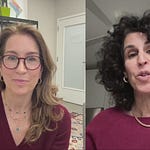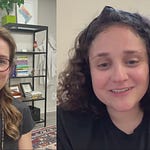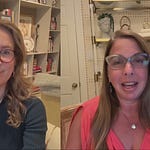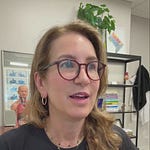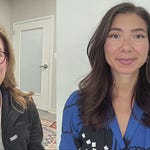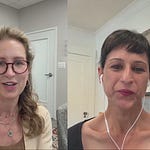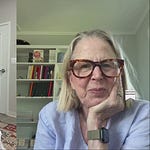You can also check out this episode on Spotify!
If you’re anything like Dr. McBride or her patients, you want to live a long life. You want to be healthy! Yet when you try to execute on your best intentions—whether it’s cutting back on alcohol, starting an exercise routine, or taming your phone addiction—you end up defaulting to factory settings.
Well, you are not alone.

The pandemic laid bare how wired and tired we are—and how desperate we are to feel better. We scroll endlessly online for wellness advice and health hacks. We grab quick hits of dopamine through sugar, shopping, booze, or whatever gizmo social media is offering up. We are sleepless and irritable and don’t know what’s wrong.
The U.S. medical industrial complex is failing people. The wellness industry is fleecing people. How do we get ourselves “unstuck” when we don’t know what questions to ask or who to trust?
Dr. McBride argues that first, we must first redefine “health” as more than a set of laboratory tests or a single visit to the doctor. To her, health is a process, not an outcome. Health is about having awareness of our medical data, acceptance of the things we cannot control, and agency over the things we can control.
She calls this the “Three As.” She argues that articulating our Three As allows us to more accurately tell our story. An honest reckoning with the Three As can put us back in the driver’s seat of our health.
In this week’s (short!) solo podcast, she explains this in more detail. She defines each “A” and suggests a way to move through this process on your own.
Spoiler alert: getting healthier isn’t particularly sexy. It’s often not very fun. It usually isn’t usually quick, and it never involves a “fix.” In reality, staring down the facts, accepting hard truths, and then challenging our beliefs and our everyday behaviors is arguably the deepest and hardest work we do.
Our stories live in our bodies. What’s yours?
Join Dr. McBride every Monday for a new episode of Beyond the Prescription.
You can subscribe on Apple Podcasts, Spotify, or on her Substack at https://lucymcbride.substack.com/podcast. You can sign up for her free weekly newsletter at lucymcbride.substack.com/welcome.
Please be sure to like, rate, review — and enjoy — the show!
The full transcript of the show is here!
Dr. McBride: Hello, and welcome to my home office. I'm Dr. Lucy McBride, and this is Beyond the Prescription. Today, it's just you and me. Every other week this season, I'll talk to you like I do my patients, pulling the curtain back on what it means to be healthy, redefining health as a process of self-awareness, acceptance, and agency.
[00:00:28] In clinical practice for over 20 years, I have found that patients generally want the same things. A framework to evaluate their risks, access to the truth and data, and tools and actionable information to be healthy, mentally and physically. We all want to feel more in control of our health. Here, I'll talk to you about how to be a little more okay tomorrow than you are today. Let's go.
[00:00:55] So today it's just you and me. I am pretty excited, because I get to talk to you the way I talk to my patients. Specifically today, we're going to talk about how we might approach the process of getting healthier. If you're anything like me or my patients, you want to live a long life, right? You want to be healthy, you want to feel good, and you probably know that there's some things you could do to be healthier, but you find them hard to do, and you default to factory settings on a day-to-day basis.
[00:01:30] Well, you're not alone. Many of us aspire to get more exercise, to eat better, to get more sleep, to manage stress. In other words, we all want to do what our doctor tells us to do, but when the rubber meets the road, it's actually pretty darn hard. So how do we actually get healthier? How do we mind that gap between our best intentions and the execution part?
[00:01:53] So let's first talk about definitions like, the definition of health. Unfortunately in the US, we kind of think of health as the sum total of our lab tests. If we have normal cholesterol and a normal weight, we're healthy. But health is not just an outcome. It's not just about the absence of disease or pain, it's also not about pleasing the doctor or winning your annual checkup.
[00:02:19] After all, as humans, we're not just a set of boxes to check, a bag of organs to fix. We are the integrated sum of complex parts, and the US healthcare system just does not do a good job of countenancing the whole person. There's such a focus on extending life, which is of course good, but at the expense of thinking about our quality of life.
[00:02:41] And unfortunately in this country, by the time most people are seniors, they have a doctor for every body part, a pill for every symptom, and no one is talking to each other. No one is talking to the patient and asking them simple questions like, how are you, Mr. Roberts? What is your story? Are you okay?
[00:03:00] What are your goals? What's your North Star? What gets you out of bed in the morning? What do you live for? And by the way, how do you define health yourself and how can I as your doctor help you get there? In fact, a lot of people, regardless of age, are walking around feeling completely disenfranchised from the medical system and disenfranchised even from their own bodies.
[00:03:26] In fact, 80 million Americans don't even have a primary care doctor. So what is health? How do we define it? Health, to me, is a process. Health is about our everyday thoughts, feelings, and behaviors. It's not just about that single point in time in your doctor's office standing on the scale in a gown. It is about the 364 days a year you're not in the doctor's office.
[00:03:53] This is where I get really excited, this is why I'm here, and I can't wait to tell you about what I call the three A's. The process of becoming healthier from the inside out. It's not easy, but it's necessary for health. In my opinion, health is a process of laddering up from awareness to acceptance to agency.
[00:04:19] So I'm going to say that again and then we're gonna break it down. Health is the process of laddering up from awareness to acceptance to agency. So what do I mean by that? First, let's start with awareness. Awareness is step one. Awareness specifically is of the facts, awareness of the facts and data. When I say facts and data, I mean metrics, physical, quantifiable information that we can measure and see.
[00:04:50] I'm talking about your cholesterol levels, your blood sugar, and your diabetes testing, your weight. I'm talking about the results of your mammogram, your colonoscopy, the PSA test if you're a man, your genetic testing when you went to the geneticist because of your family history of breast cancer. These are the things that we can hold onto because these are the things that we can see, that we can quantify and that we can measure. And this kind of traditional medical data is essential to know for our health.
[00:05:19] But guess what, it's not sufficient and there's actually more data we need to collect. Quantifiable information that often gets missed in the doctor's office. Things like, what is your family structure? Are you a middle child? How were you raised? Were you raised in an urban or rural setting? What were your environmental exposures as a kid?
[00:05:40] Were you raised in poverty? What was your socioeconomic status? What about your job? What are the facts of your employment situation? What are the facts about your children, your parents, and your family's system? What is your cultural background? What are your religious beliefs? What about your educational status?
[00:05:58] How many pets do you have? What we need to gather are facts about you historically and currently that are unequivocally true. So this is step one, gathering facts and data, finding out what is true and putting these facts in a box. Now modern medicine is happy for you to stay here, for you to measure your health as the result of your lab data.
[00:06:22] Medicine is happy not to consider the other contextualized facts I just went over about who you are, what happened to you, and what are the realities, factual realities, of your life. In fact, modern medicine is delighted for you not to climb the ladder any further and to keep you stuck in the lobby.
[00:06:42] But let's not stay stuck. Let's do it. Let's ladder up and let's talk about acceptance as the next rung of the ladder. So this is where it gets hard. This is where people push back. This is the common sticking point where people have a hard time, and this is where we get into some of that magical or even delusional thinking that guess what, we all do.
[00:07:05] This is where the rubber meets the road, and it's where we have to acknowledge facts that are unpleasant, that are ugly, but are true. And this is where we have to cope, or else we get stuck on the first rung of the ladder. When I am talking about acceptance, I mean making peace with the things we cannot control, accepting the things we cannot change, and that is hard. For example, let's talk about your biometric data.
[00:07:36] You might have high cholesterol readings despite being an avid runner, eating vegetables and a vegan diet, you have no body fat. Yet your cholesterol levels just won't budge. And you may be really ticked off that you can't exercise your way out of this fixed reality. You might even have to take Lipitor because of your family history of premature heart disease.
[00:07:59] And in the meantime, you might be like one of my patients who's trying to exercise their way out of this fixed genetic reality. Running yourself ragged, blowing out your knees on the running trail, popping a bunch of Advil, when what you really need for health is less running, some physical therapy for those knees, and a dose of acceptance about your genetics.
[00:08:23] So the first part of acceptance is really looking at all that data and the awareness box. Shining a light on those dark corners, looking at things we don't necessarily want to see but that are true, and we have to cringe and we have to swallow our pride, and we have to recognize that we do not have control over every aspect of our bodies, minds, health and life.
[00:08:48] We just don't. There are things that were given to us like genes. There are things that happen to us like trauma or neglect or bad breakups or hard times. And then there are environmental factors, family dynamics, birth order, special needs kids, aging parents, things that we are exposed to that we cannot change and we cannot control.
[00:09:11] And it's when we start to accept the things that make us human and the sometimes unpleasant realities of our lives—that is the birthplace of health. So here's where I want to say very clearly that acceptance is not about giving up. Acceptance is not about throwing in the towel. It's about making peace with the things we cannot alter and change in our lives.
[00:09:36] Acceptance is not about being passive. It's about taking active control over the finite resources of our body, mind, and spirit. And so whether it's things that are innate, that are biologically fixed or that are emotional, behavioral, social, or even structural in nature, acceptance is about reclaiming the energy and brain space that is occupied by trying to change the things we cannot change, and then moving that energy into a more positive, productive place.
[00:10:12] It's about taking charge. It's about being in the driver's seat of our health. Now, no one is saying that acceptance is easy. In fact, like I said earlier, this is where most people get stuck. And we don't often even know that we're stuck. But this is where we all get stalled out. Accepting things that we don't want to accept and that we desperately want to change, whether it's about ourselves or what happened to us or about other people or our environment is an extremely hard thing to do.
[00:10:46] It's a process. It can be painful, and we're also never really done with the process of acceptance. But I will say it again, that acceptance is a necessary process of becoming healthier from the inside out. It's essential for minding the gap between our best intentions and the execution of them.
[00:11:08] Acceptance is also part of this laddering up process to be able to more accurately tell our story to ourselves, to the people around us and then to our doctors. All right, so let's move up to agency. Agency is the next rung of the ladder. Agency is where it gets fun. It's a little sexier. It's where the action is, there's movement, there's momentum.
[00:11:31] But remember, we can't get to agency before we have worked on acceptance. Why? Because we've jammed up all of this real estate in our brains by trying to control the things we cannot control. So here's the cool thing. Once you have put all of those facts and data into the box and you've accepted the things you cannot control, everything else is fair game.
[00:11:53] Everything else is changeable. You can actually change the way you think, the way you feel, the way you behave. You can actually rewrite your story. You can tell a more accurate version of your story that is rooted in facts with all the junk and waste cleared out of the way. So what is agency? Agency refers to our capacity to exert control over our thoughts, feelings, and behaviors.
[00:12:21] We all wanna live in that agency space. We all wanna make changes, be better. New Year's Day is a perfect example of aspirational, almost delusional agency at its finest. It's when people newly sign up for the gym, they drop the booze, they commit to yoga, I'm gonna start meditating we all say to ourselves. We're trying to get from point A to point B.
[00:12:43] We're trying to make changes to be healthier. But if we haven't taken the time to understand the facts, the realities of our lives. And the medical data that is actually part of our health makeup, and if we haven't gone through the exercise of separating fact from fiction and accepting unpleasant parts of ourselves that we cannot change, then agency is gonna be uniquely challenging.
[00:13:07] We are going to set ourselves up for failure, and by the time February rolls around the wheels come off the bus. And despite our best intentions, we default to factory settings, trying to get things done, and we're wondering why the hell don't we feel well? So that's normal. That is human, and this is what I see every day.
[00:13:24] This is what I do myself. Instead of being intentional all the time, I'm reacting to what's happening in my external and internal world, and I spend a lot of wasted energy trying to control the stuff I can't control instead of leaning into the parts where I do have control and understanding where I have agency.
[00:13:41] Let me give you an example of a patient I recently saw, and I'll tell you how we walked through the three A's. So, this patient is a middle-aged woman who's overweight, she has an arthritic painful hip, and she comes in to see me and she says to me, “Dr. McBride, I really wanna lose weight, but I can't. I can't exercise.
[00:13:58] It's driving me nuts and I don’t know what to do.” So we go through her data. She has high cholesterol, she has pre-diabetes. Her BMI is in the obese range. On her x-ray, she has bone on bone arthritis. Some of her data is favorable. She has healthy lungs, she has a healthy heart. She has a stable job, a supportive spouse, and really good health insurance.
[00:14:21] Other facts and data that we gather are that she has a very busy job, a long commute, and a gym that is very far from her home and work. She's also a parent, and notably, her mom had a hip replacement for severe arthritis that went badly, and her mom ended up seriously ill and quite depressed.
[00:14:41] As an oldest child she likes control, and she worries a whole lot about her health, and finds herself overeating at night because of worry. So those are some of the facts about this patient's health. In order to get to acceptance, the next rung of the letter, we need to take all of those facts, put them in a box, and then take a hard look at each piece of data and figure out what we need to accept because we do not have control over it.
[00:15:07] For example, we have to accept the sad reality that her mom had a bad outcome from a surgery that my patient herself needs. But we can look at the facts of her mom's situation. We also have to accept the fact that her weight and her relative inactivity because of her hip, are driving her high cholesterol and her diabetes testing.
[00:15:27] In fact, when I knew her 10 years ago and her weight was more normal and she was exercising more regularly and eating more intentionally, her cholesterol and her blood sugars were normal. So we know that these biometric pieces of data are dynamic and they're dependent on her level of movement and diet.
[00:15:45] In other words, we are not going to accept that she is destined to have heart disease and diabetes. However, we need to accept the fact that this arthritic hip is not going to get better on its own. That there's no amount of Advil or waiting it out that is going to get it better. So it's time to accept the fact that this is now a surgical problem.
[00:16:04] We also need to accept that she has this habit of overeating when she's anxious. We can accept that. But what we can do is work on the anxiety and the fear itself. Let's move into agency. Now that we have accepted these realities of her life and these parts of her health that are unpleasant, and we've decided not to accept that she is destined to have high cholesterol, diabetes, and a limp for her whole life, and she's not destined to become her mother, we can lean into the agency and put her back in the driver's seat of her health.
[00:16:38] And then we're going to talk about how to rebuild trust in orthopedic medicine and how to find her a physician who will listen to her concerns, and help her get the treatment she needs. We're also going to go back into her laboratory data from 10 years ago, and we are gonna look at the facts around her habits when her cholesterol and her blood sugar were normal, and we are going to forecast her being able to move and live her life the way she wants to, to be able to bring those numbers down over time.
[00:17:08] But in the meantime, given her age and her family history and her predisposition to heart disease, we are going to add a small dose of Atorvastatin to bring her cholesterol down under 100, which is the standard of care for someone in her situation. Now I remind her that when she gets that new hip, when she is able to go back to her swimming, her dance class that she loved so much, and when her cholesterol levels come down, we can always pull that cholesterol medicine away.
[00:17:39] In other words, let's meet the fixed unpleasant realities of her life that she cannot exercise right now. And let's treat the medical issues using evidence-based medicine, and let's follow up and change that recommendation as the conditions change. And as for her natural anxiety about having to have surgery, about her anxiety about her health, I'm going to recommend that she start journaling, prioritizing sleep, and consider seeing one of my great psychotherapists, to help her reroute those hardwired, almost reflexive patterns of thought, feeling, and behavior.
[00:18:12] Like, I feel scared. I am scared. I'm gonna go eat something I regret later. And to help her rewrite her own story so that she is in control of her mental and physical health in tandem. The overarching goal here is to help the patient rewrite the story that she has told herself. That she is broken, that she is obese, that she is incapable, and that she's going to become her mother.
[00:18:36] That story, it’s a story she's told herself again and again, and that can be rewritten when we go through the process of the three A's. As I talk about a lot, our stories live in our bodies, and it's when we are able to do an honest retelling of our stories, and fact check the stories we've been telling ourselves, that's when we can start to work on accepting things we can't control and where we get to open up the door to more agency.
[00:19:05] Okay, so what's the take home? What is the upshot for you, dear listeners, after you've listened to this diddy about the three A's? Here's my advice. Grab a pen and an old fashioned pad of paper. Think about a problem you have in your health or in your life, and then write down the narrative you have about it.
[00:19:26] Write down this story in your mind about the reasons you cannot solve this problem. Write down in a very honest, sober way, about what are the facts about this condition? Have you gathered all the facts? And then go through this exercise. Find the facts, whether that involves your doctor or asking your parents about your genetic history, or asking your spouse or your kids or yourself about the facts of this condition.
[00:19:53] Maybe it's a heart condition, maybe it's arthritis, maybe it's depression, maybe it's alcohol overuse. Whatever it is, and bring it to your doctor and see if an honest telling of your story helps you squeeze the juice out of the medical system, and helps you get a little healthier from the inside out. Over the next couple of weeks and months, I'm going to be fleshing this out a bit more.
[00:20:18] I want to talk a lot about the acceptance part and why that is so hard. How do I help people learn to accept the things they can't control? Where do people get stuck and what is all this magical, delusional thinking that we all do? Let's hash it out. And then let's talk more about the agency part. Let's talk about how we mind that gap between our best intentions and the execution. And why we can't get to the other side.
[00:20:42] So I'd love to help you. I'd love you to stay tuned. In the meantime, join me on my Substack at lucymcbride.substack.com/, and I would love your comments about this podcast. Drop me a note below. Tell me what you think. Tell me what you'd like to hear more about. I will see you next time. Thank you so much for joining me.






